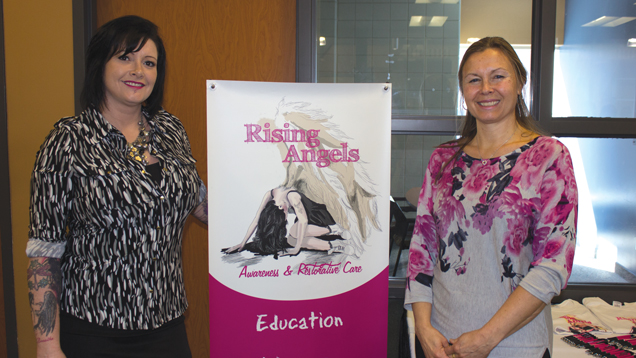London called a "gateway city" for human trafficking
 CREDIT: KERRA SEAY
CREDIT: KERRA SEAYSex trafficking survivor Katarina MacLeod (left) spoke at a panel about the reality of human trafficking in London. She was accompanied by her mentor Sheila Howlett and said that without her support, MacLeod would never have gotten out of "The Game."
Katarina MacLeod, a survivor of sex trafficking, was only fiveyears- old when she was sexually assaulted for the first time. She said it was this abuse that led to choices that eventually took her down a tragic path into the world of prostitution, domestic violence and substance abuse.
MacLeod told her story as part of a panel discussion on the impacts of human trafficking. The event took place in Alumni Lounge on March 8.
The panel featured speakers from a variety of London-based organizations, including Sgt. David Ellyatt and Rob Wever from the London Police Service (LPS), Megan Walker from the London Abused Women’s Centre (LAWC) and a number of survivors who fight for victim’s rights.
According to the United Nations (UN), human trafficking is defined as, “the recruitment, transportation, transfer, harbouring or receipt of persons, by means of the threat or use of force or other forms of coercion… for the purpose of exploitation.” This exploitation can include prostitution, trafficking for the purpose of labour and even for the purpose of organ removal.
The panel focused on the sex trafficking portion of the broader human trafficking issue. London is known as a “gateway city” for human trafficking victims due to the fact that the city is along the 400 highway system, making it easy to transport victims from one city to another, even crossing the border into cities like Detroit.
Human trafficking, specifically sex trafficking, is referred to as “The Game” by pimps.
Ellyatt said they have been in contact with victims who have been trafficked as far as British Columbia and Las Vegas from London.
Sgt. Ellyatt said investigating human trafficking is particularly difficult because many victims are manipulated into falling in love with their abusers. They refuse to seek help and often do not cooperate with police. He said thousands of hours of manpower can go into researching the “spiderweb” woven by traffickers.
“Just touch one little line [of the web] and the next thing you know you’ve opened Pandora’s Box, and each of those little strings have to be followed up on,” Ellyatt said. “Each follow-up can take days, weeks or months. It is quite time consuming… but we do it because we have to, to save people from a life of slavery.”
On March 5, London City Council denied the LPS request for funding that would specifically be directed towards investigating human trafficking in the city. The LPS did not comment, but Walker said this shows that city council, much like the rest of Canada, is not keeping up with what is necessary to end human trafficking for good.
“It’s indicative that city council doesn’t understand the emerging needs of the community,” Walker said. “I was actually dumbfounded... The amount of funding they cut from police service comes directly on the backs of women and girls in this community.”
As a way to help other victims of human trafficking heal from their trauma, MacLeod formed an organization called Rising Angels. Her mission is to raise awareness about human trafficking through education and to provide support services for survivors.
“I had a vision. I wanted to help, I wanted to give back and I wanted to set up an organization. I wanted it to be something different, and Rising Angels was born. All these girls are angels, and they’re all rising up. They’re my angels,” MacLeod said.
She added that she wanted to give other girls the same opportunity to get out of prostitution that she had.
“I wanted to be a voice for the voiceless… I wanted people to understand that prostitution is not a choice,” MacLeod said. “I’m one of the lucky ones, but not all girls are as lucky as me.”
In 2014 the Harper government enacted Bill C-36, or the Protection of Communities and Exploited Persons Act, which criminalized advertising and purchasing sexual services. This makes the act of pimping illegal and protects the prostituted victim. Under this legislation the LPS acted upon search warrants involving the website Fantasy World Escorts, a site that advertised escorts available in the London area.
The Globe and Mail reported in November 2015 that Hamad Andwar and Tiffany Harvey, two London residents, were charged with material benefit from sexual services, possession of proceeds of crime exceeding $5,000, trafficking in people and advertising another person’s sexual services in connection with the site.
London was one of the first cities to charge someone with the charge of advertising another person’s sexual services in the country.
The website, fworld.com, has been shut down by the LPS, and the case against Andwar and Harvey is ongoing.
MacLeod, along with the other speakers, urged the community to do what they can to prevent human trafficking from proliferating.
“It’s our responsibility as a community, and just as people in general, to come alongside and help these girls,” MacLeod said.
If you have any information about a possible case of human trafficking please contact the London Police Service, the London Anti- Human Trafficking Committee or the Coalition Assisting Trafficked Individuals.














